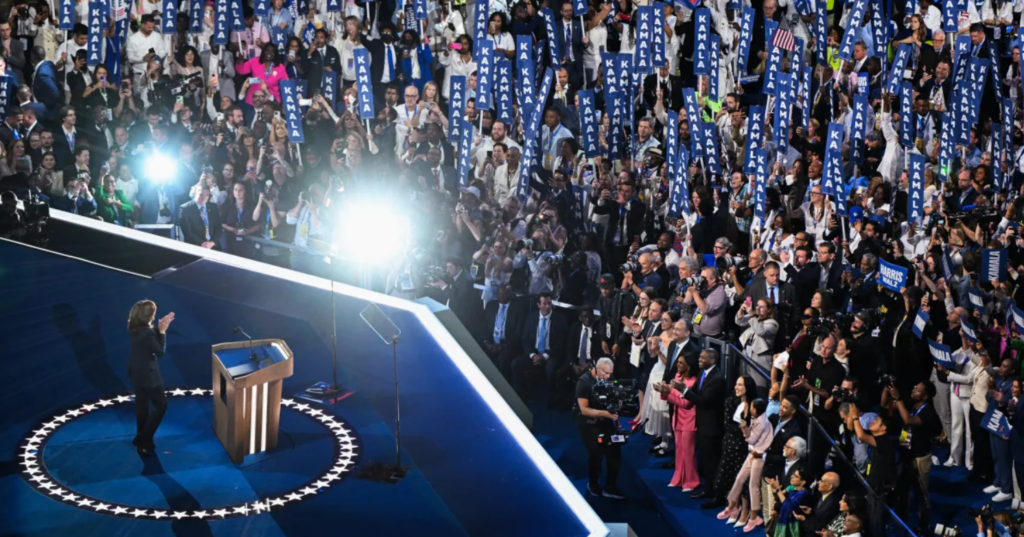How Republican and Democratic convention delegates reflect American political divides

Introduction: For over a year, President Joe Biden’s message to the American people was stark. He warned that the 2024 election threatened the country’s core foundations. If former President Donald J. Trump were re-elected, Biden claimed, the United States would face an apocalyptic future. Now, the tone of the campaign has shifted significantly following Biden’s departure from the race, with Vice President Kamala Harris stepping up to lead the Democratic ticket. The presidential campaign has reached a critical point as Harris publicly accepts her party’s nomination, making history as the first Black and South Asian woman to lead a major party’s presidential bid. Meanwhile, economic policy remains in focus, as the Federal Reserve’s chairman has indicated that “the time has come” to decrease interest rates, citing falling inflation and signs of a weakening labor market. The broader political landscape remains deeply divided, as reflected in the sentiments of delegates attending both the Democratic and Republican conventions. Democratic and Republican Conventions: A Nation at a Crossroads In Chicago and Milwaukee, the Democratic and Republican parties held their national conventions, each with the same goal—energizing their voter base ahead of the 2024 election. At the Republican National Convention, Donald Trump declared that America’s future would be “bolder, brighter, stronger, greater, and more united than ever before.” He criticized his political opponents, stating that in less than four years, they had turned “incredible success into unparalleled tragedy and failure.” Meanwhile, at the Democratic National Convention, Kamala Harris emphasized her vision of uniting the nation, stating that she would rally Americans around their highest aspirations. She issued a stark warning about the consequences of returning Trump to the White House, calling them “extremely serious.” Notably, Harris had not even formally secured the Democratic nomination when the Republican convention took place in Wisconsin, highlighting the uncertainty and rapid developments within the Democratic Party. Divergent Perspectives from Party Delegates Republican Delegate Alberto Herrera (Texas) Alberto Herrera, a delegate from the border town of Mission, Texas, expressed concerns about the direction of the country. “I love to say that America is in a good direction right now. But it’s obviously not the truth. Unfortunately, Donald Trump is going to be blamed for all the stuff that happened in the last four years, and he’s going to try to repair it. And I think he will do the best he can.” Herrera also warned that, regardless of leadership, Americans must take collective responsibility: “If we, as Americans, don’t get our act together, it doesn’t matter how good a president we have—it’s going to be a hard, hard ride.” Democratic Delegate Christian Figueroa (California) Christian Figueroa, a Democrat from Southern California, painted a contrasting picture. He expressed frustration over divisions within the Democratic Party: “There is a set of people in the Democratic Party who, over the past few years, seem to have chosen violence, division, anger, and retribution as a method of leading—or so-called leading.” Though delegates from both parties acknowledged the concerning state of political division in the country, they had differing views on its root causes. Republican Delegate Jesse Franklin (California) Jesse Franklin, another Republican from California, blamed the media for influencing public perceptions: “People who take the time to really think about every issue for themselves, instead of just looking online or turning on the TV, may be well-intentioned, but they are sometimes misled.” Democratic Delegate Robert Branscomb (Arizona) Robert Branscomb, a Democrat from Arizona, cited polarization in Washington as a key issue: “I think we got in this place because we entered into tribalism. We Democrats have our progressive side, and Republicans have their extreme MAGA side. And it became unpopular to talk to each other.” Branscomb also raised concerns about fundamental rights, particularly abortion rights: “If you don’t have abortion rights, then what other rights are you going to take away from us? As an African American, we have voting rights, we have social rights. You have transgender rights. You have Project 2025 talking about dismantling our government, taking away the educational departments, things like that. These things really hurt and harm our country.” Republican Delegate John Leiber (Wisconsin) Wisconsin State Treasurer John Leiber, a GOP delegate, reflected on how partisanship had intensified over time: “Even here in Wisconsin, the friendly atmosphere has broken down in the last couple of decades. Democratic and Republican legislators used to be able to meet, go have a beer, and talk to each other—but today, that doesn’t happen.” Democratic Delegate Caleb Fulforf (Virginia) Caleb Fulforf, a delegate from Virginia, believed the rhetoric of Donald Trump played a significant role in political polarization: “Politics used to be a side topic. It used to not define you as a person. But now, if you’re a Republican or a Democrat, people assume they can identify your entire set of moral beliefs, judgments, and opinions. This comes from the politics of hate, from the top down.” Kamala Harris Officially Becomes Democratic Nominee The 2024 Democratic National Convention, held from August 19 to 22 at the United Center in Chicago, Illinois, formally nominated Kamala Harris as the party’s presidential candidate. She chose Minnesota Governor Tim Walz as her running mate. The convention marked a historic moment, as Harris became the first Black and South Asian woman to be nominated for president by a major political party in the United States. She is also the first Democratic presidential nominee from the Western U.S. Adoption of Early Virtual Nomination Vote Following concerns over President Biden’s debate performance in June, some House Democrats had pushed for the cancellation of the virtual roll call vote initially scheduled for mid-July. After internal deliberations, the Democratic National Committee (DNC) decided to delay the vote until August 1. After Biden’s withdrawal, Harris swiftly announced her bid for the nomination, and the Biden campaign formally transitioned into the Harris for President campaign. By July 23, major Democratic leaders, including House Minority Leader Hakeem Jeffries, Senate Majority Leader Chuck Schumer, and former House Speaker Nancy Pelosi, had thrown their support
